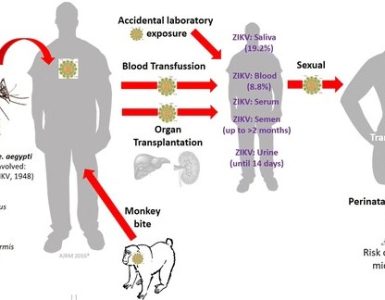 The Ministry of Health, in its efforts to reduce the incidence of meningitis epidemic that regularly hits the northern sector of Ghana, has introduced a new vaccine “Meningitis A Conjugate Vaccine” (MenAfriVac) to prevent Meningococcal Meningitis ‘A’ epidemic in the three northern regions.
The Ministry of Health, in its efforts to reduce the incidence of meningitis epidemic that regularly hits the northern sector of Ghana, has introduced a new vaccine “Meningitis A Conjugate Vaccine” (MenAfriVac) to prevent Meningococcal Meningitis ‘A’ epidemic in the three northern regions.
The Meningococcal disease is an infection of meninges, the thin lining that surrounds the brain and the spinal cord. It is usually caused by a virus or bacterium (meningococcal).
The vaccine, specifically made for Africa, was expected to prevent 123,000 deaths by 2018; prevent permanent disability in 287,000 children and adults; prevent 11 million DALYs lost – the sum of year of potential life lost due to premature mortality and the years of productive life lost due to disability- and save approximately 99.7 million dollars in medical costs for diagnosis and treatment.
The new vaccine has already been introduced to Mali, Niger and Burkina Faso which is expected to be particularly effective in protecting children less than two years of age, which hitherto could not be covered under the old vaccine, the conventional polysaccharide vaccines.
The vaccine was funded by Global Alliance for Vaccines and Immunization (GAVI), World Health Organization (WHO), UNICEF and Ministry of Health (MOH) and would be administered free of charge to the public.
Dr Nana K.O. Antwi-Agyei, Programme Manager, Expanded Programme on Immunization (EPI) of the Ghana Health Service, said this at a press conference organized to highlight activities of the 2012 Meningitis ‘A’ Preventive Campaign.
He said they would embark on a 10-day mass immunization of Meningitis ‘A’ Vaccination Campaign in the three northern regions from October 2 to October 12, this year, on the theme: “Stop Meningitis, get Vaccinated Now”.
Dr Antwi-Agyei said the campaign was targeted at all persons from the age of one to 29 years who were the most vulnerable group when it came to meningitis epidemic. He said evidence suggested the vaccine induces a higher and more sustained immune response in that age group and that explained why the GHS was targeting that age bracket. The 10-day campaign, he said, was aimed at vaccinating at least 95 per cent of the target population.
Further, he said, other objectives of the MenAfriVac were to maintain stock of vaccines for epidemic response, enhance surveillance and national capacity building and improve case management. Besides, he claims, the success of the campaign lay in the flow of the supply chain and the effectiveness of the social mobilization, and how all diverse events following immunization reported during and after implementation were treated and properly investigated.
Mr Rojo Metle Nunoo, Deputy Minister of Health, in a speech read on his behalf by Dr Addae Donkor, Deputy Director of GHS, said Ghana and other sub-Saharan countries have been experiencing explosive and repeated meningococcal epidemics over the years.
He said those epidemics occurred every eight to 12 years in 25 countries of the “meningitis belt’’ and around 450 million people in those areas were at risk of the disease.
“The epidemics usually start during the dry season (January to March) and end at the onset of the rainy season (May to June). An epidemic wave can last two to three years, and receding during intervening rainy season,” he said.
Mr Nunoo said over one million cases of meningitis had been reported in Africa since 1998 and that in 1996 to 1997, one of the largest epidemic waves ever recorded swept across Africa, causing over 250,000 cases and 25,000 deaths.
“In Ghana, there were 18,703 cases and 1,356 deaths reported between November, 1996 and May, 1997 in the northern Sector,” he added.
He, therefore, encouraged the public the targeted areas to come out to participate in the programme.
Dr Iyabode Olusanmi, UNICEF Representative in Ghana, said Meningitis A vaccine had been tested and proven to be safe and several million doses had been given in several parts of the world, including neighbouring countries such as Burkina Faso, Mali and Niger.
She said all forms of adverse events following vaccination with Meningitis A Conjugate Vaccine were rare and occurred in about one to two per 10,000 people vaccinated.
“Severe adverse events occur in about one per 1,000,000 people vaccinated. Vaccines are constantly being monitored to ensure that any adverse reactions are recorded and investigated,” she said.
Dr Iddrisa Sow, World Health Organization Country Representative, said the initiative of manufacturing and making it available for affordable prices came after the 1996 and 1997 epidemic.
He said the Meningitis A Vaccines was a fast track vaccine with a South-South cooperation where India helped a lot.
He said there were different types of meningitis and having the disease after the vaccine should not bring doubt about the efficacy of the meningitis A.
Source: Ghana News Agency

















